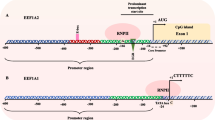Summary.
An increasing number of evidences suggest the involvement of the eukaryotic elongation factor 1A, a core component of the protein synthesis machinery, at the onset of cell transformation. In fact, eEF1A is shown to be up-regulated in cell death; moreover, it seems to be involved in the regulation of ubiquitin-mediated protein degradation. In addition, eEF1A undergoes several post-translational modifications, mainly phosphorylation and methylation, that generally influence the activity of the protein. This article summarizes the present knowledges on the several extra-translational roles of eEF1A also in order to understand as the protein synthesis regulatory mechanisms could offer tools for cancer intervention.
Similar content being viewed by others
Author information
Authors and Affiliations
Rights and permissions
About this article
Cite this article
Lamberti, A., Caraglia, M., Longo, O. et al. The translation elongation factor 1A in tumorigenesis, signal transduction and apoptosis: Review article. Amino Acids 26, 443–448 (2004). https://doi.org/10.1007/s00726-004-0088-2
Received:
Accepted:
Published:
Issue Date:
DOI: https://doi.org/10.1007/s00726-004-0088-2




